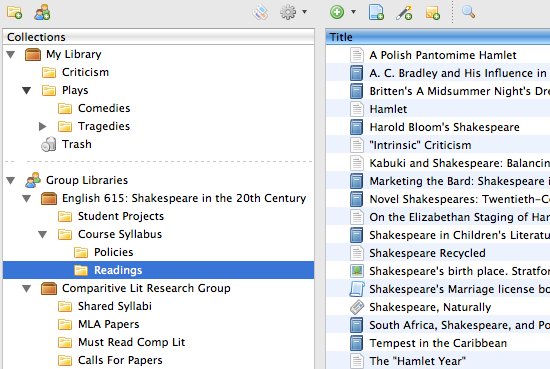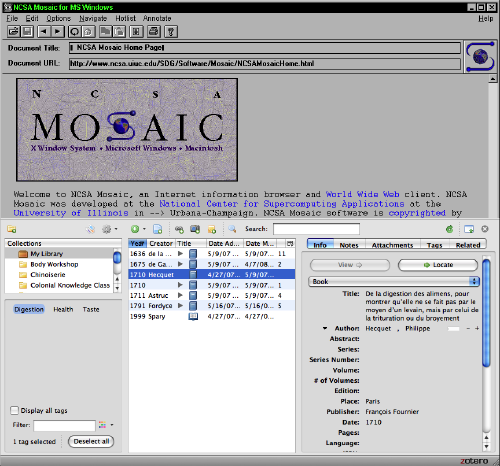One of the requests from our gathering of Zotero trainers and promoters at the Zotero workshop last month was for more resources to help promote and spread Zotero at their institutions. To help support our evangelists, we have pulled together this list of ten reasons for institutions to adopt Zotero. Consider forwarding this on to the folks that make tech decisions at your institution. We have also put the list together as an attractive PDF.
1) Easy-To-Use Means Easy-To-Support
Users overwhelmingly report that Zotero is easy to use and intuitive. After watching a five-minute introductory video on Zotero, many users have more than enough knowledge to accomplish basic research tasks.
2) Save Money With Free Open Source Software
Say goodbye to expensive escalating licensing fees. Adopt Zotero and pay nothing. Not only can you use Zotero for free, but all the documentation at Zotero.org is yours to reuse and repurpose. The support community at Zotero.org provides an experienced responsive community to support the software and assist you in your efforts.
3) Hundreds of Institutions Recommend Zotero to Their Faculty and Students
Zotero is already recommended by more than a hundred institutions from around the world, including MIT, Stanford, and Yale. Zotero’s track record of success at these leading institutions underscores its ease of use and elegance as a research management tool.
4) A Single Research Management Solution For Every User, Everywhere
Whether your users run Windows, MacOS or Linux, Zotero is available to them. By syncing their data with the Zotero server, users can move between computers at home and at school with ease, even if the operating systems are different. Users don’t even need their own computers, because they can run Zotero off a small flash drive, which they can purchase for only a few dollars. With Zotero’s web interface, users can browse their collections online, even with mobile devices. Simply put, Zotero is wherever your users are.
5) Did We Mention It’s Award Winning?
Zotero was selected as the best reference management tool at CiteFest 2008 by Northwestern University’s Library and Academic Technologies group. That’s right, better than other, more costly, software alternatives. Zotero is among the “Best Free Software” available, as voted by PC Magazine in both 2007 and 2008. Zotero was also named Best Instructional Software of 2007 by the Information Technology and Politics Section of the American Political Science Association.
6) An Opportunity For Your Institution to Leave Its Mark
Zotero’s open and extensible nature means that, beyond offering a powerful resource to your students at a no cost, Zotero also offers a potential avenue for your institution to make lasting contributions to the open-source community. For example, the University of Michigan’s School of Information recently won funding from the Institute for Museum and Library Services to launch a new million-dollar information literacy game, Bibliobouts, on top of Zotero. Similarly, Concordia University’s digital history lab was granted funds from the Social Sciences and Humanities Research Council of Canada to develop Vertov, a video annotation tool for Zotero. Both instances demonstrate how institutions can make Zotero more than a piece of software used on their campus; it can also provide a means to contribute and make your mark on the scholarly cyberinfrastructure.
7) Your Users’ Data is Theirs, Now and Forever
Everything your users do with Zotero is theirs in perpetuity. As a project developed by scholars with a commitment to openness and with a focus on the end-user, Zotero makes no claim of ownership or control over any of your users’ work with Zotero, and invites users to share and collaborate without fear of their work being co-opted.
8 ) Give Your Users Something They Can Take With Them
Licensed research management platforms may provide your users with functional services, but, chances are, your software license ends when your students graduate. Shouldn’t your users have access to their research after graduation? Zotero is free to everyone; that means your students will always have access to their collections.
9) Adherence to Open Standards Offers Flexibility
Zotero is committed to data portability and interoperability through adherence to existing open standards. Software makers which employ site-licensing fees have a vested interest in locking users into their own proprietary formats. Zotero makes it as easy as possible to migrate data to and from other applications.
10) Give Your Users The Freedom To Work In Their Native Language
Zotero runs in more than thirty languages, so chances are good that most of the languages spoken on your campus are available. This sort of linguistic agnosticism means that Zotero runs smoothly for people all around the world. Any languages not already supported can easily be added through the BabelZilla project.



